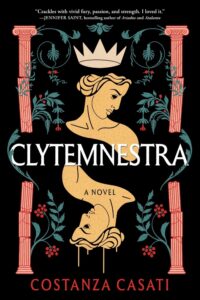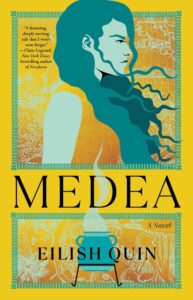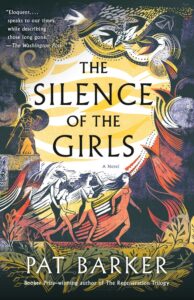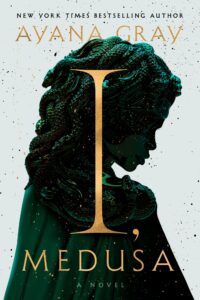Compared to the heroes and heroines of most of Greek mythology, our most shocking modern criminals, though they leave swaths of destruction, are still milquetoast wannabe, practically plagiarists of the gruesomeness of our culture’s foundational stories. For serious cases of messed-up murderous mayhem, especially within families—hot crimes of passion and cold, calculated acts of revenge—look to the classics. For rage raised to an art form, look to myth.
Like true crime, myths make for addictive storytelling. They’ve held us captive for millennia. But they’re more than entertainment. We need myths to give us a vocabulary for our raw emotions, to arm us with metaphors that can encompass the worst things that humans do to one another.
Mythical adaptations and literary myth retellings are especially hot right now. Here’s a little flight of pairings for you, a wine-and-cheese party of recent literary myth retellings matched with just one of many possible true crime parallels that wish they were as rage-filled or maniacal as the ancient Greeks of lore.

Clytemnestra by Costanza Casati
A classic tale of revenge: Clytemnestra has achieved her happily ever after in Sparta with her husband Tantalus and their infant child, until Agamemnon arrives on the scene. Refusing to take “no” for an answer, he murders her husband and dashes their infant on the ground, then forces her into an unwanted marriage. Just imagine the pillow talk between that cozy couple. Somehow she bears him children (more on them below) including a daughter, Iphigenia, whom Agamemnon later sacrifices when an oracle tells him doing so will grant him success in the Trojan war. Clytemnestra has more reasons to hate her husband than Medusa has serpents. She bides her time before repaying her husband, with help from her lover, Aegisthus, for her slaughtered first love and her two murdered children.
True crime parallel? Pamela Smart follows Clytemnestra’s footsteps, conspiring with her lover, a teenaged high school student, to murder her husband. But whereas Smart disposes of her husband to avoid the financial ruin of divorce, Casati’s literary Clytemnestra, with her lover, Aegisthus, makes Agamemnon pay for all he stole from her in his fanatical pursuits—first of her, then of glory in battle. Smart’s murder of her husband was unconscionable. Clytemnestra’s has all the weight of poetic justice on her side.
Verdict: Guilty, but find a jury of mothers willing to convict Clytemnestra.

Medea, by Eilish Quin
Medea is best known for murdering both her children after her husband, Jason, takes a new wife. Let’s cut her a little slack; she fell prey to an Aphrodite-inflicted passion for Jason so all-consuming that to help the unworthy jerk, she betrayed her father and slaughtered her own little brother. If that doesn’t make a girl feel her dude owes her something, I don’t know what does. Let the Jasons of the world beware: don’t trifle with the passions of a sorceress.
An inexcusable crime, but Eilish Quin’s retelling offers sympathetic insight into Medea’s mind. Her Medea is a headstrong and talented mage who manages to break free of her father’s control when she helps the Argonauts and the fickle Jason complete their quest. She’s no pawn of the gods or doormat to her boyfriend, as he soon learns.
True crime parallel? The spurned Medea is a family annihilator, like Susan Eubanks, the woman who, after her husband left her and a boyfriend threatened to leave, murdered her four sons to punish their fathers. The note she left behind to one of the fathers read, “I’ve lost everyone I’ve ever loved. Now it’s time for you to do the same.”
Verdict: Guilty, and even the mom-jury would convict Medea, but they’d feel terrible doing it.

The Silence of the Girls, by Pat Barker
In this retelling, set during the sacking of the kingdoms surrounding Troy, captive Briseis waits to discover if the Trojans will successfully vanquish their enemies, and if she might regain her freedom. Taken as Achilles’s concubine, she becomes an object of contention between the famed warrior and the leader of the Greek forces, Agamemnon. (Yes, him again.)
True crime parallel? In The Silence of the Girls, we get the story not of a villain but of a victim. Briseis’s experience with human trafficking is especially relevant nowadays with cases like Virginia Giuffre’s and Gisèle Pelicot’s making international headlines. By giving voice to these women whom their exploiters have sought to silence, Barker shines a powerful light on a personally devastating yet global and ubiquitous crime. (Giuffre’s memoir, Nobody’s Girl, will release posthumously later this year.)
Verdict: For Achilles, Agamenon, and all human traffickers, ancient and modern, guilty as sin. The mom-jury would have their hides.

Elektra, by Jennifer Saint
This retelling intertwines three women’s stories: the vengeance-seeking Clytemnestra, the doomed Cassandra, and Elektra, daughter of Clytemnestra and Agamenon, who is fiercely loyal to her father. The novelized retelling provides an alternative take on this child-sacrificing, human-trafficking tyrant. Like her mother, Clytemnestra, Elektra yearns for vengeance, and sets after it with the assistance of her brother, Orestes.
True crime parallel? The Menendez Brothers famously killed their parents–possibly for their inheritance, possibly in self-defense. Money seems to have motivated Ronald DeFeo Jr. (of Amityville Horror fame), Christopher Porco, and Jennifer Pan, all of whom tried to murder both parents and succeeded in killing at least one. Elektra and Orestes only had one motive: cold-blooded revenge against the matriarch who did their father wrong.
Verdict: Elektra and Orestes are guilty, but with mitigating circumstances. In Greek culture, avenging a parent’s murder was a divine mandate. Children of two parents who murdered each other inherited a Gordian’s knot dilemma—they were damned if they did avenge or didn’t. Mitigating circumstances notwithstanding, I’m pretty sure the mom-jury would’ve had little use for this matricidal pair.

I, Medusa, by Ayana Gray
This Medusa retelling won’t be published until November, but consider Medusa: a woman assaulted by Poseidon in Athena’s temple, punished for the crimes of her assailant while he’s allowed to go free. Transformed into a monster, she punishes men who would do her wrong with her fatal gaze (until one lops off her head).
True crime parallel? Medusa is every woman who came forward during the #MeToo era, whose career suffered, whose reputation was destroyed, whose inner life imploded as a result of harm, violence, or misuse of power against her. Mira Sorvino, Rose McGowan, Ashley Judd, Simone Biles, Lady Gaga, or Monica Lewinsky or the hundreds of other women (and men) labelled “difficult” because they chose to name or stand up to the perps all deserve better than they got.
Verdict: Medusa is not guilty, but she has a head full of snakes and knows how to use them. Even so, the mom-jury unanimously votes to acquit.
***
Julie Berry is the author of If Looks Could Kill, a myth-meets-true-crime mashup pitting Medusa versus Jack the Ripper. She’s also the mom of four boys who know she’s got her eye on them.


















